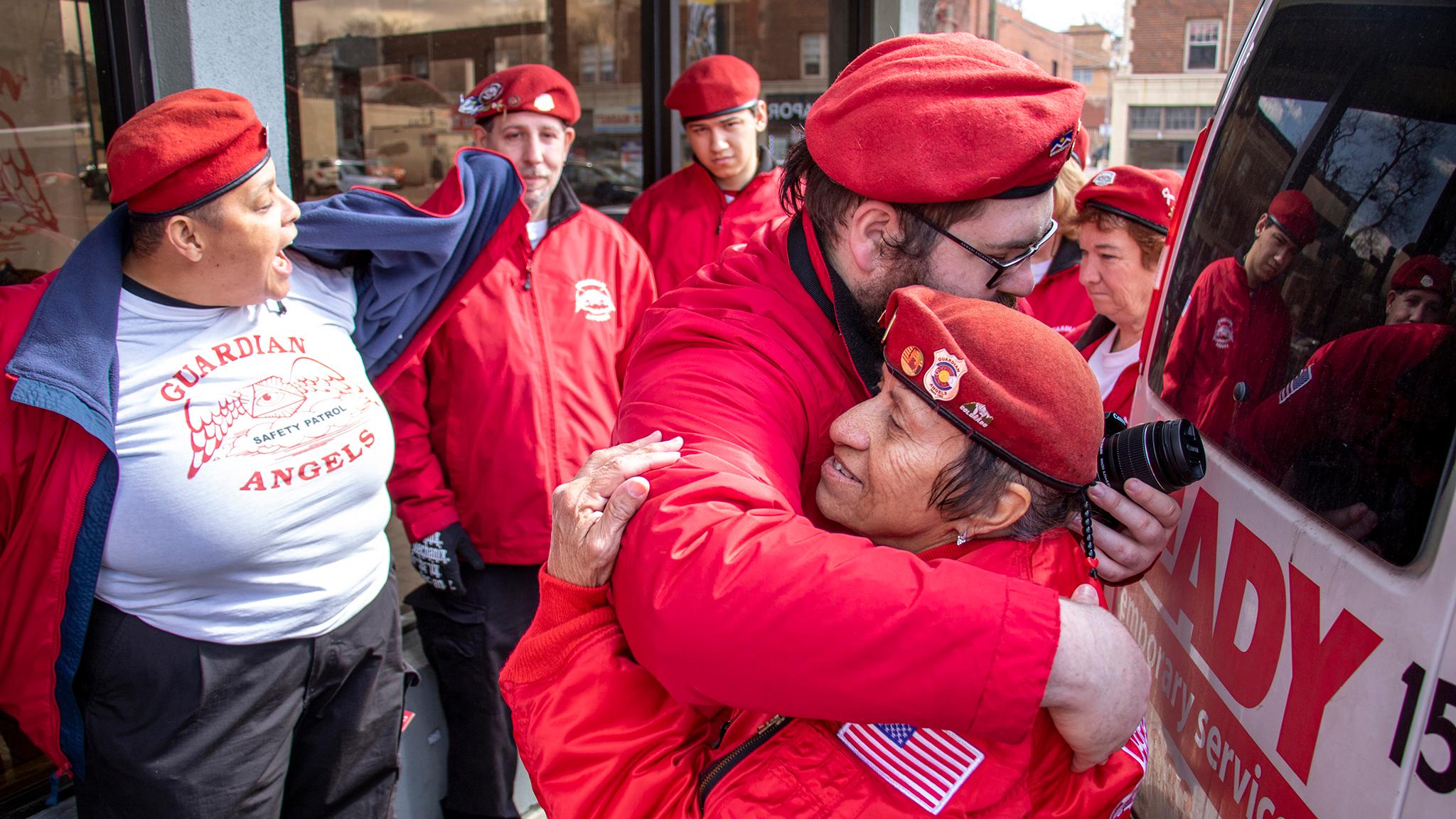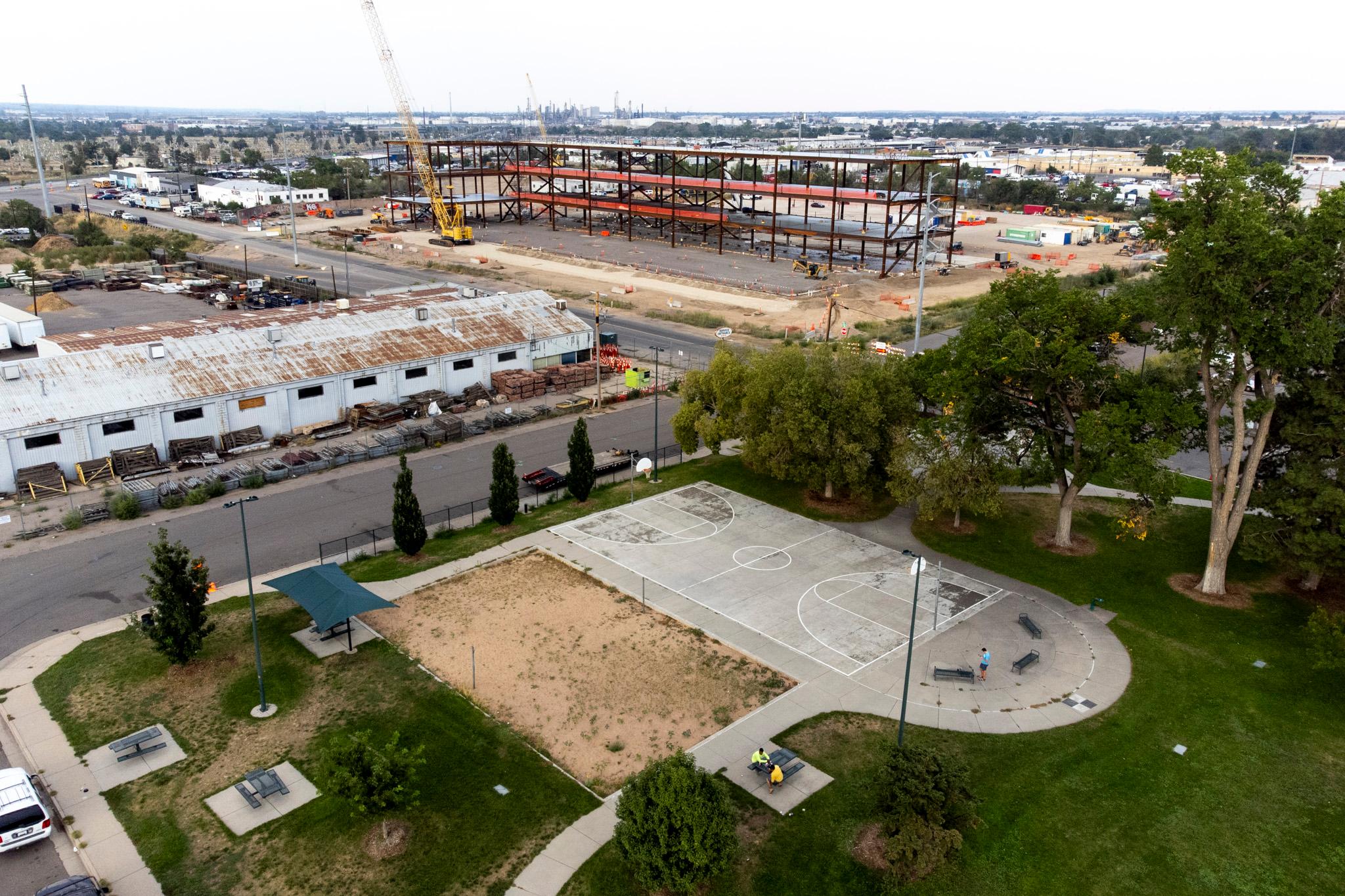Twenty-five years ago this month, the Colorado Guardian Angels graduated its first class of volunteer safety patrollers clad in red berets.
If you're of a certain age, you're likely familiar with the group, which was founded in the late '80s by Curtis Sliwa in New York City and quickly expanded to major cities across the U.S. and eventually around the world.
In Denver, the Angels were born after the "summer of violence." In the early '90s, several high-profile incidents sent the mostly sleepy city into a panic. It was the right moment to emerge on the scene. While chapters in other cities faced opposition from police, Denver's cops were less skeptical of extra eyes on the streets and the group was allowed to patrol.
For years, teams of Angels acted as visual deterrents. They'd stand watch on seedy Colfax street corners, keeping the potential for violence at bay by virtue of their presence. At their peak in the mid-'90s, they had enough members to walk Capitol Hill seven days a week.
More than 100 people became official Angels in that first class, adorned with uniforms and street names. Sally Martinez chose "Apache."
(Full disclosure: the group made me an honorary member because I've been following them around with a camera since 2015. They call me "The Flash.")
She was already a grandmother when she heard that the Angels were recruiting. She wasn't sure what to expect -- someone had told her they were a "vigilante group," a reputation they still battle today -- but she showed up even though her boyfriend at the time told her not to.
During the first training, she recalled, she saw the recruits engaged in a knee stretch that she "didn't agree with," so she marched up to the front of the room to show the large group the right way to do it. She'd been an aerobics instructor, after all.
Sebastian "Iron" Metz, an early leader who came to start Denver's chapter, interrupted her. This was his show.
"This is the most embarrassing thing that ever happened to me," she remembered thinking to herself. "I got back in line and trained the Guardian Angels way."
But it was also the start of Apache and Iron's long friendship. She would become his right hand and spend the next 25 years as the Denver chapter's administrative leader, making sure the group had everything they needed to maintain their presence. She even went on to travel with Sliwa and his Angels around the world, setting up conferences and working with chapters in Tokyo and Berlin.
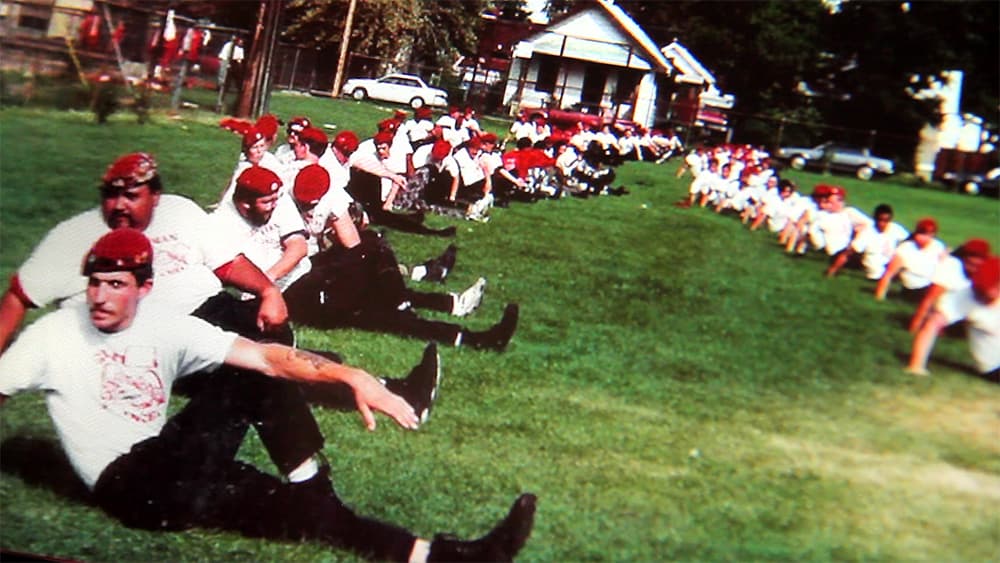
Last week, Apache patrolled Colfax Avenue with a crew of Angels as they celebrated their first class' anniversary. It was also something of a send-off for her and her husband, Tom "Kukulkan" Garcia. She's 71, a great-grandmother now, and they're ready to retire to a warmer climate: Tucson, Arizona, where she'll be closer to her twin brother.
Today, their numbers have dwindled and the neighborhood has become a safer place. The allure and fame that once surrounded the Angels have faded, and chapters around the country are now trying to figure out how they might attract younger generations to keep their missions going strong.
Apache's leave is an end of an era for Denver's Angels, but it also may mean the beginning of a new chapter
Robi "Wolf" Salo is the chapter's current leader. He graduated in 1994 alongside Apache, and said he's going to miss her.
"That's a tough one," he said. With her and Kukulkan leaving, "It's gonna put a hole in the chapter, they do so much around here."
But Wolf also hopes it might create an opportunity to reinvigorate their ranks.
"It's going to be a loss," he said, "but it's going to open up, hopefully, a challenge for the younger members to step up."
In the last couple of years, Wolf, Apache and company have worked to attract new recruits. They've established a Facebook page, they carry information to distribute to the many curious passers-by they meet on the street and, Wolf said, they've taken to a "softer sell" than they're used to. Potential recruits are welcomed to stop by on a Saturday evening to check out what it's like as they head out on their weekly patrol.
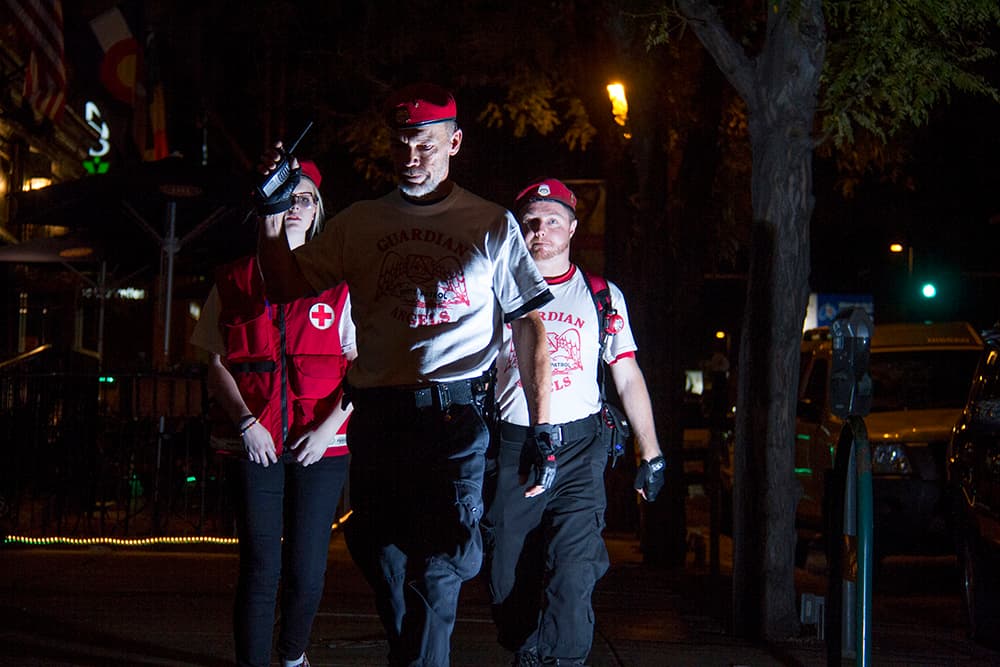
These days, that mostly looks like a stroll from their headquarters at Colfax and High Street to the Capitol and back. They stop in to say hello to business owners they've developed friendships with over the years: folks behind the counters at Bourbon Grill, Great Wall and City Grille. Every now and then there's a fight to break up along the way. In winter months, they check with folks sleeping on the street to make sure they're not in danger of freezing to death.
Last week, Apache had words with a group of people yelling at each other at a bus stop. They said they were just messing around, but she wanted to be sure a fight wasn't about to break out. Kukulkan was stopped by a curious man who wanted to know what was up with the uniforms. He gave them a brochure and a quick spiel.
"You're kind of like superheroes," the guy said.
"Yeah, I guess you could say that," he replied.
If nothing else, patrol is a time to reminisce about the glory days, though members are hopeful good times are ahead
Rob "Bigfoot" Piotrowski was another graduate of that first class, a member for five and a half years and the leader before he had to move to Fort Collins. He's now the mayor of Ault, a small town north of Greeley, and said his interest in civic leadership drove him to join back then.
"When I started, about 18 years old, I was in the military. When I came home," he said, "I was looking for something and I was watching TV and I saw the Angels were coming to town. I said, 'I want to join up on that.'"
His first patrol, he recalled, was a wild one.
"We walked eight minutes out of our headquarters and arrested a dude for selling eight rocks of crack on the corner of Colfax," he said.
Wolf told Denverite that the Angels were trained in making citizens arrests. They avoided physically detaining anyone, unless an accused criminal started a fight first. Instead, he recalled, they'd surround a dealer or a thief who would usually just stay put as they radioed back to headquarters to call the cops.
"We got that guy and walked down the street, and that very same night we had a guy pull a gun on us -- well, he told us he had a gun," Bigfoot remembered. "When we actually got him down and checked him. He didn't have a gun. It was a very exciting first patrol."
Another night, he and some Angels were standing on Colfax, waiting for someone to grab a soda, when a car came out of nowhere toward them.
"As he rolled up on us a gun comes out the window. He fired nine rounds at us, I thought we all were going to die," he said. "I don't know what he shot at, and I don't know what he hit, but we all got up and started chasing him. He turned the corner right there by the Ogden and the police arrested him. And right after the arrested him, all the people came out of the concert and started rioting around the police, so we all formed a line around the two police officers so reinforcements could arrive."
Bigfoot didn't sleep much that night.
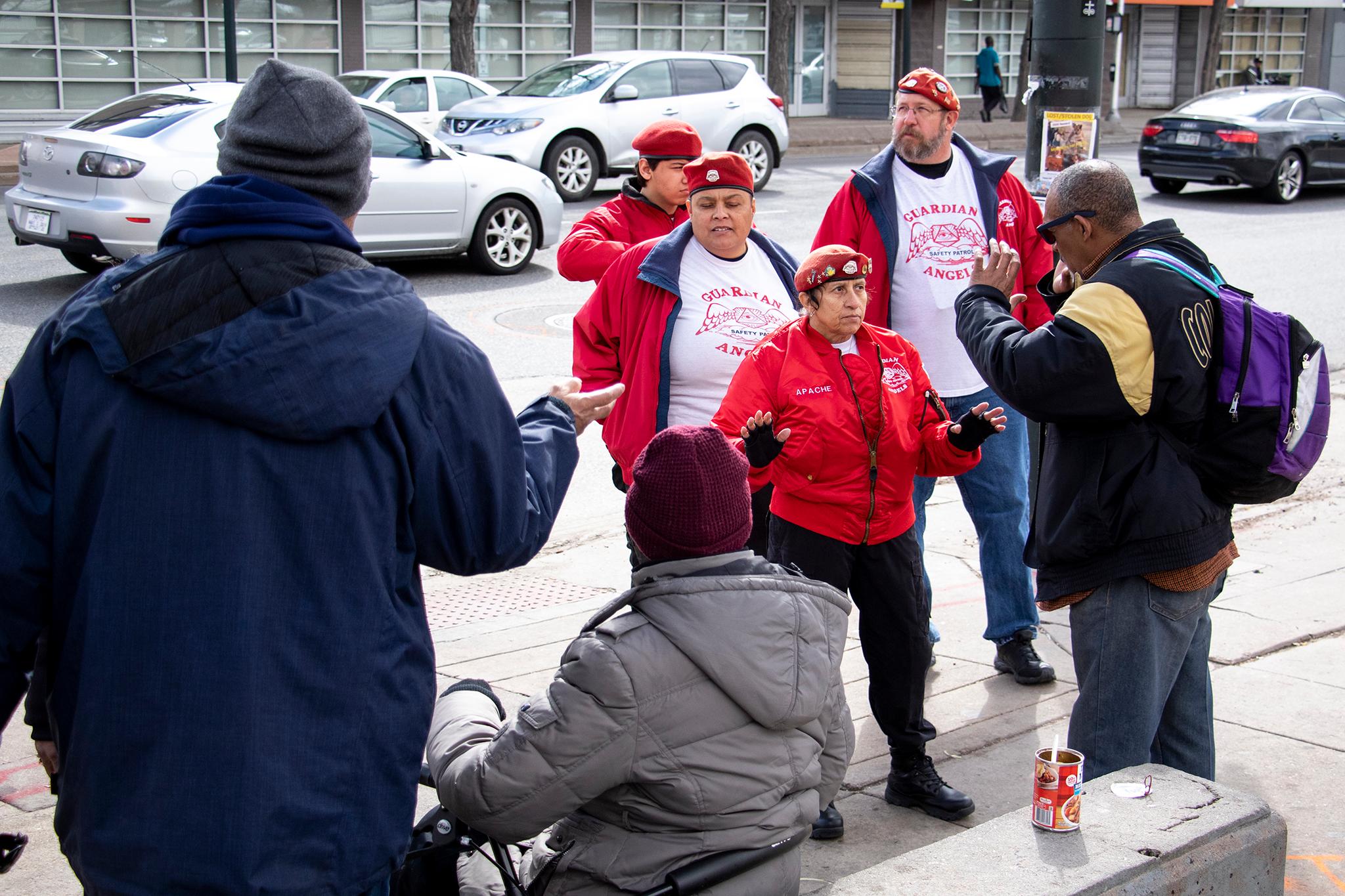
It's been some time since he regularly patrolled the neighborhood, but he said he hopes the Angels will still have a presence there five or ten years into the future.
"People stepped up, took over" when he left, he said. "The same thing will happen this time."
While some young faces have come and gone, there was at least one teenager on patrol alongside Bigfoot last weekend.
Sabre, who declined to give his real name, grew up watching his dad, Navajo, leave on Saturday nights to join the Angels. At 16, he's a little young for the group, but he was eager to join when he had the chance.
"After the first day of checking it all out, I was like, 'This is amazing!'" he said. The group's camaraderie and mission were a major attraction.
While he said his friends don't exactly get it, he's fired up to help the group try to engage more people his age.
"If we keep advertising and say, 'This is what we do, and you can actually have an impact on the community,' I think we can have a new generation of Angels."
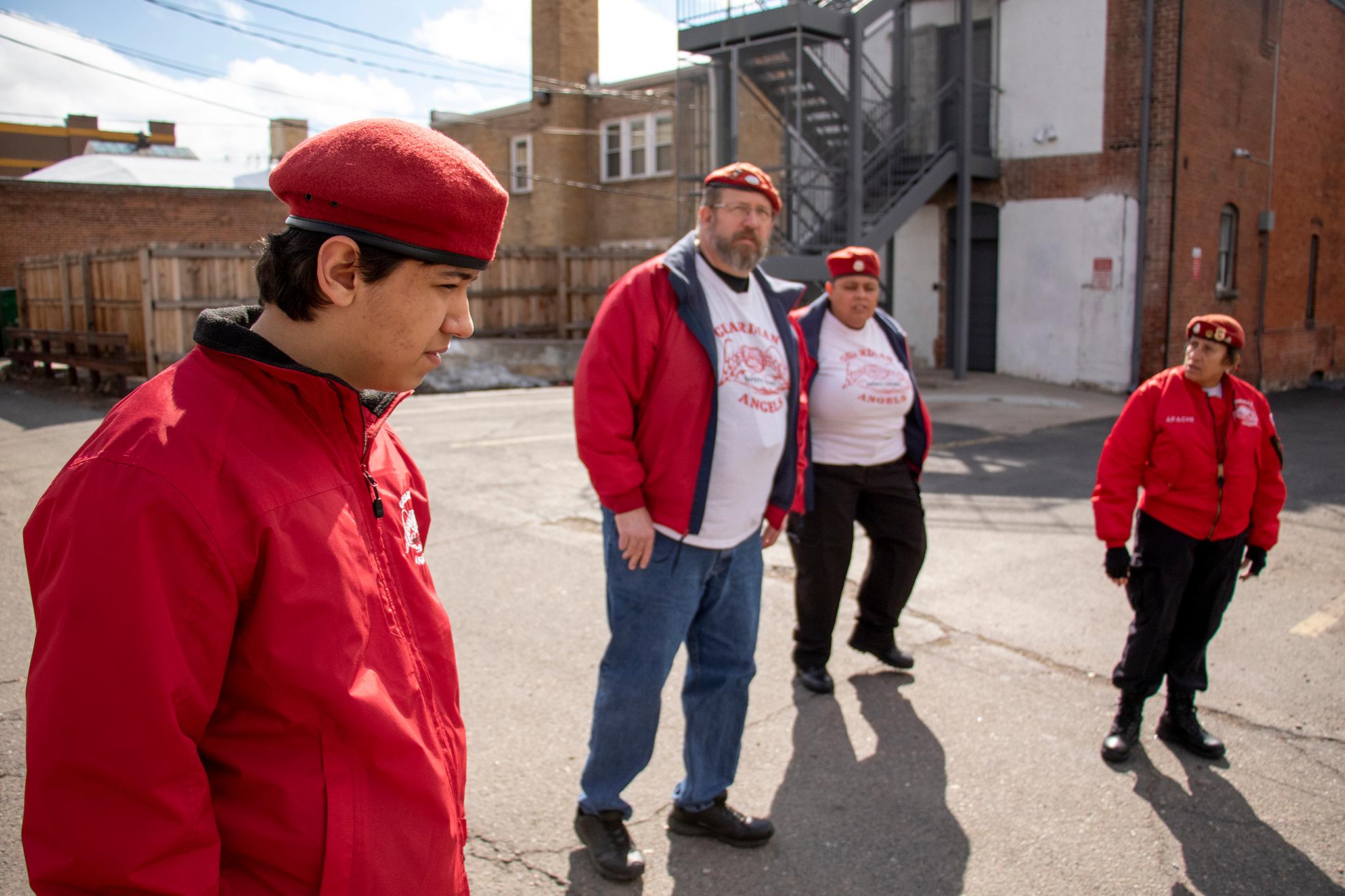
The key to this, Apache thinks, will be changing with the times.
"I do believe the Millennials and the new age of kids will come up and take our place. I feel like if we can share our old ways with some of the kids' new ways, we can come to a happy medium," she said. "Maybe our way of doing things will come to an end, but I think the new ways, we should embrace them."
Toni Ricks, too, was a member of the 1994 class who patrolled with Apache last Saturday. While she's sad to see Apache go, she said the long-time Angel has earned her retirement.
"It's probably time for her to do something different. She's been doing it for a long time. She's been keeping the angels going, and it's going to be a great tragedy that she is going to be missed, because she's carried this program for a good 25 years. She's been a great friend over the years."
Apache said she hopes her departure won't mean a serious disruption for the Colorado Guardian Angels.
"It'll be an end of an era for me," she said, "but I think it's on the upsweep, I think we're going to survive."
You can read more about the Colorado Guardian Angels' early history and Kukulkan's transformation from street tough to Angel in our previous story.

